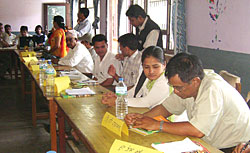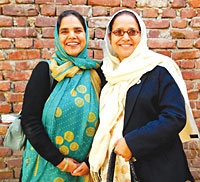 |
Harihar Sharma, Nepal Student Union
The writing of the constitution is taking place at an exceptionally slow rate. Issues like federalism, state restructuring, framework of the administration and other issues have not yet been discussed. The leadership is not at all serious about constitution-writing and is not concerned about what the people want.
K.B Rana Magar, Parents' Organisation Nepal
We hear that the suggestions put forward by the people of Baglung have been shelved in some corner of the district development office. Indeed CA members are attempting to write the constitution irresponsibly.
Durga Dutta Acharya, Nepal Press Union
CA members visiting rural Nepal is just paying lip-service. Constitutions have been written in the past, it is now important to evaluate how much they addressed people's grievances. If the leaders are sensitive towards what Nepali people want, they have to deliver on their promises.
Man KC, Nepal Teachers' Union
The fact that the CA members visited rural areas to seek the opinions of people at the grass roots is noteworthy.
Netra Bahadur Bista, Akhil Nepal Teachers' Union
Leaders are distracted by the formation of government and who is going to get what cabinet portfolio. A consensus government can help us move forward towards constitution writing.
Bir Bahadur Biswokarma, Dalit rights activist
The questionnaire developed to ask for suggestions for the new constitution was complicated. More outrageous is the fact that the CA members did not prioritise the rights of the underprivileged Dalits. There is a risk of Dalits being left far behind in the new constitution.
Raju Gautam, President, Nepal Bar Association
All the dilly-dallying in constitution writing only proves that the CA members are not serious about it. There's a fear that this new constitution will be passed like the interim constitution, where a handful of CA members decide the clauses. Those CA members who were collecting suggestions took no responsibility for the complicated questionnaires they were carrying.
Ram Sharma, advocate
The questionnaires that were taken to the people were hard to understand. Until just a month ago the suggestions from the people of Parbat were not taken to the right place. Whose responsibility is that? It is not too late, if we unanimously push for democracy the new constitution will be written on time.
Mukesh Chandra Rajbhandary, journalist
The draft that the political parties put forward has not yet reached the people, who doubt that their views will be represented.
Shakuntala Sharma, Inter Party Women's Alliance
The majority of women never received these questionnaires. All groups are appealing to be represented in the new constitution. In such a situation, are issues relating to press freedom, rule of law and human rights just not being prioritised?
Din Bahadur Thapa, vice principle
Taking locals who speak the language to interpret questionnaires would certainly have been more fruitful. There is a possibility that the country may be divided along linguistic lines. To prevent this division issues regarding languages must also be tackled.
Dharma Bahadur Kunwar, Rastriya Janamorcha
Federalism is not the only option. If the CA members really wanted positive feedback they should have also suggested an alternative framework to federalism. This could have been reflected in the questionnaires. No space was given to the fact that federalism divides a nation and its ethnic groups and destroys camaraderie amongst communities.
Should the constitution be based on ethnicity, language, culture, or region?
Anju Lamichane, women's rights activist
Federalism should not be formed on the basis of language or ethnicity. It should include all sections of society. There's fear that a federal structure may encourage separatism. Political parties should not thwart constitution writing.
Prem Prasad Sharma, social worker
There is a process to writing the constitution of a country. That process involves every citizen being involved in discussions so as to help decide how Nepal must become a federal state.
Amit KC, activist for the disabled
Special rights must be given to marginalized communities. Leaders have to study the geography and understand the psychology of the Nepali people. If some communities do not think that Nepal should be a federal state, it is their right to think so.
Sunita Gauchan, social worker
There is a tendency to use young people for political purposes and abandon them when the political interests have been fulfilled. The need of the hour is to provide employment to the youth of Nepal.
Bharat Poudel, CDO
Unless we Nepalis change our intrinsic behaviour, democracy will only remain in slogans. Democracy has given the people the opportunity to voice their opinions. We must cherish the diversity while addressing issues related to ethnicity and not point fingers at each other.
Life behind the veil
Two Muslim sisters show it is possible to fight for rights in the Tarai's conservative society
KONG YEN LIN in NEPALGANJ
 KONG YEN LIN WOMEN OF SUBSTANCE: Mohammadi (right) and Maimoona set up the Fatima foundation that works for the upliftment of Muslim women in Banke, like this one (left) who is learning to sew so she can be financially independent. |
She had spent most of her married life within the confines of her house, donning a burka in her rare trips to the market. But a supportive mother-in-law encouraged Mohammadi to work as a human rights activist, especially to empower fellow Muslim women.
Six years ago, Mohammadi and her sister Maimoona set up the Fatima Foundation in Banke to uplift Muslim women. The organization now has 22 volunteeers and tackles problems like child marriages, polygamy and domestic violence.
"There is a dearth of religious laws in Nepal safeguarding social justice for women," says Mohammadi, "on top of that,
there is also a lack of female participation in law enforcement and the judiciary."
Since the lack of education is such a barrier for Muslim women to be financially independent, Fatima has started a skills training centre to teach Muslim women how to sew and paint. "This makes them less dependent on the family and gives them confidence," says Maimoona, a 45-year-old mother of three and graduate from Gorakhpur University.
Fatima is trying to prevent child marriages and has set up a watchdog community operating undercover on tip-offs. Fatima recently conducted classes for women from 23 VDCs of Banke to educate them on their constitutional rights. "Awareness is the first step towards reform and equal participation," says Maimoona.
The sisters have survived threats and intimidation from some male members of their community and mullahs. "At first even my brothers-in-law disapproved, now the mullahs have written letters recognising my efforts," says Mohammadi with a smile. She is now a CA member, and recently completed her Bachelors degree in Sociology from Awadh University in India.
Mohammadi is excited about the new constitution: "Finally the laws of the land will pave the way for greater participation of women from different castes and ethnicities."


